#mousai deities
Text
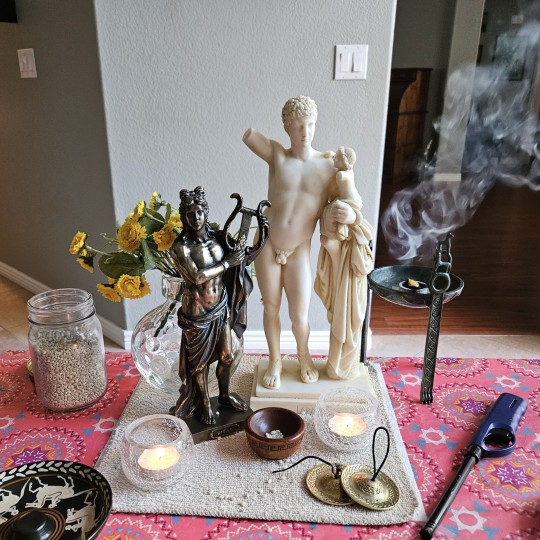
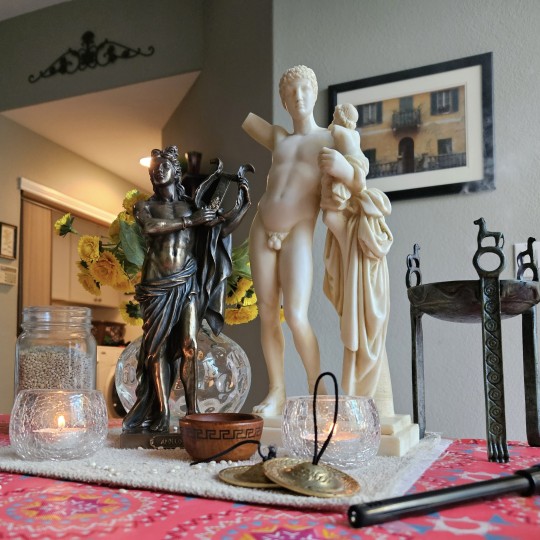
Tending the dining room altar. :)
#Meleagros’s#Hermes#Hermes deity#Apollo#Apollo deity#The Mousai#The Muses#Greek gods#Greek god#Greek goddesses#Greek goddess#Hellenic polytheism#Hellenic polytheist#Hellenic paganism#Hellenic pagan#Hellenic reconstructionism#Hellenic reconstructionist#Hellenic revivalism#Hellenic revivalist#Helpol
404 notes
·
View notes
Text
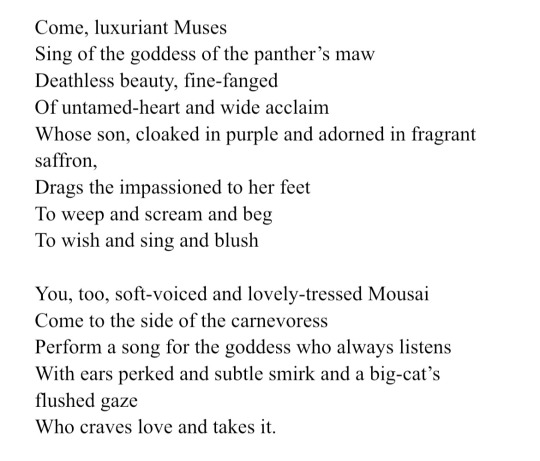
(6 August 2023)
#i did this one at the beach (-:#my poetry#Aphrodite#Aphrodite deity#Mousai#devotional art#helpol#personal#prayer
101 notes
·
View notes
Text
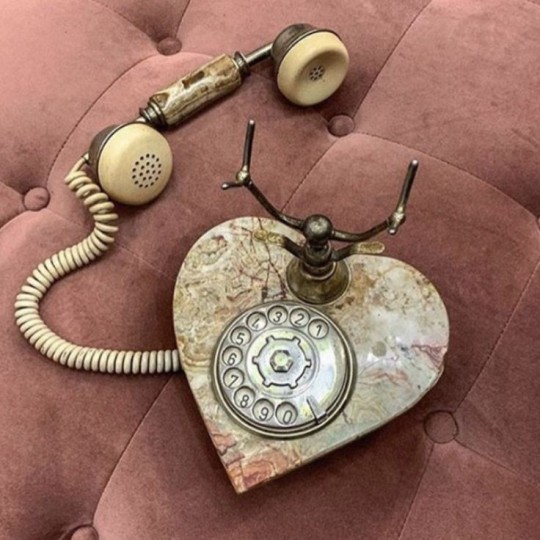
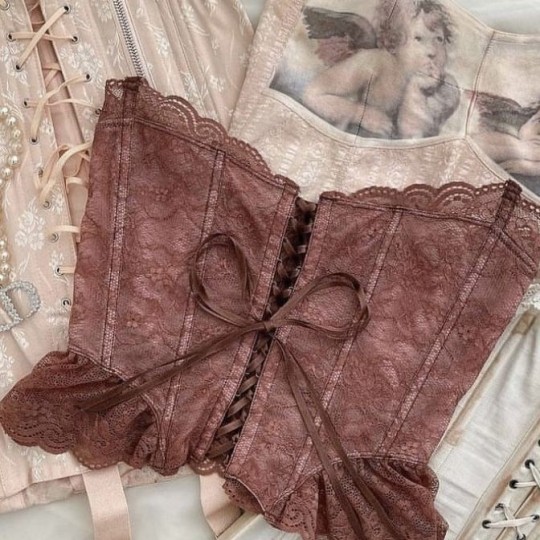
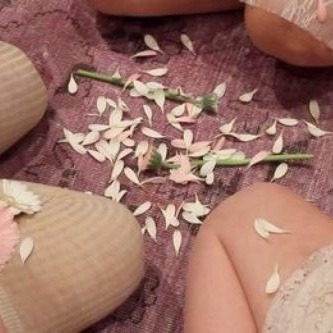
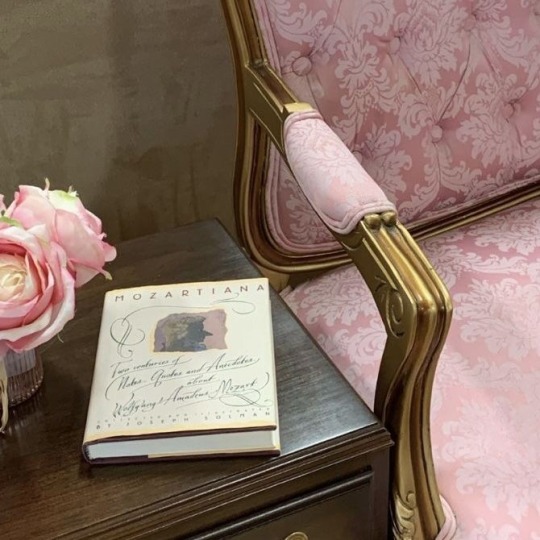
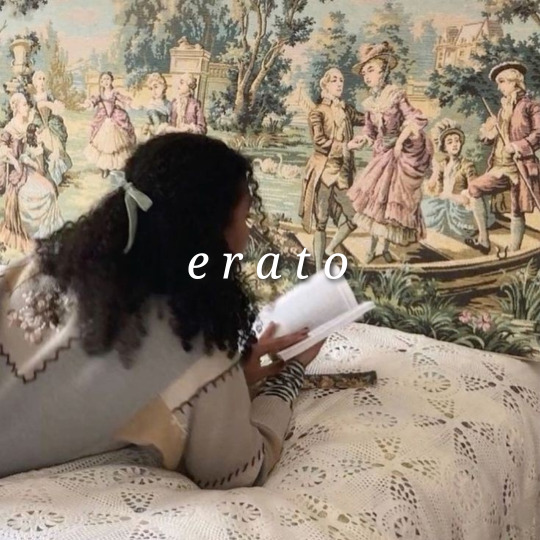
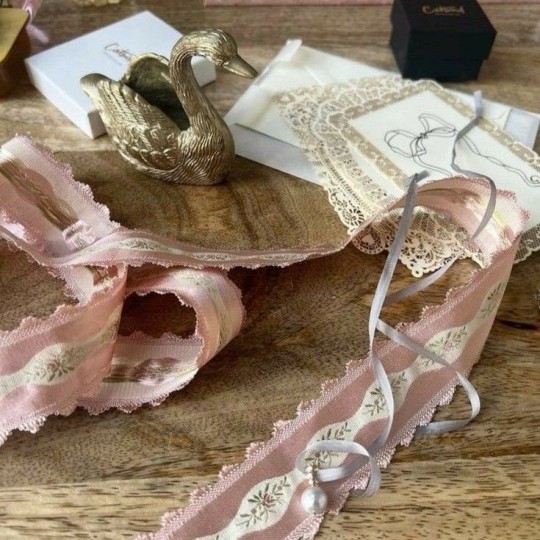
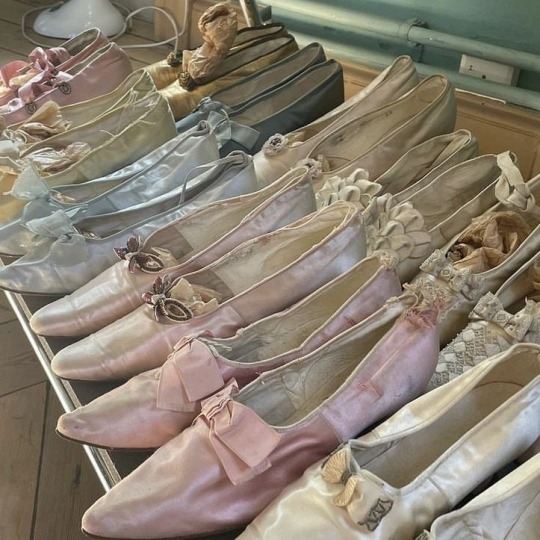
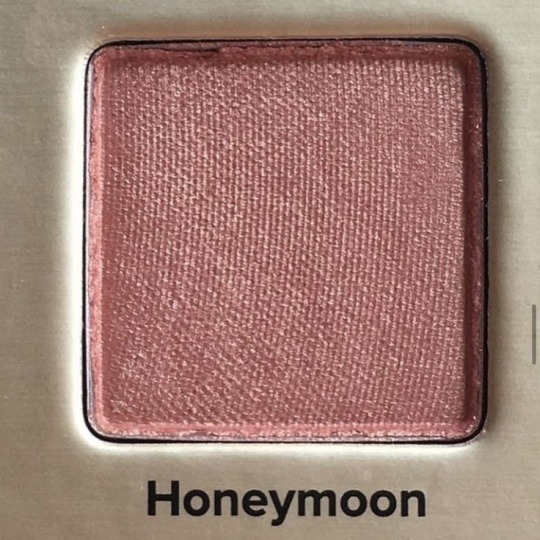
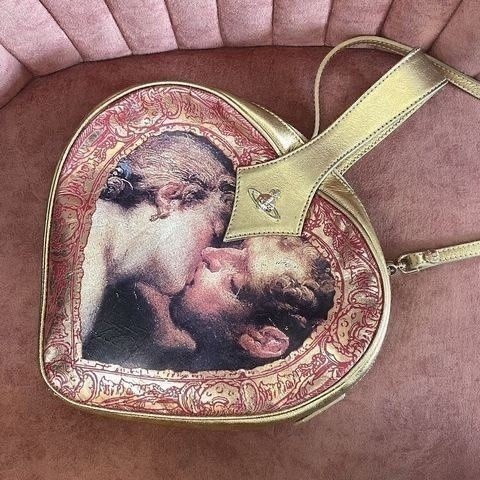
𝒆𝒓𝒂𝒕𝒐 ; 𝒈𝒐𝒅𝒅𝒆𝒔𝒔 𝒎𝒖𝒔𝒆 𝒐𝒇 𝒍𝒐𝒗𝒆 𝒑𝒐𝒆𝒕𝒓𝒚 💖📜
[please reblog or like if you saved]
#erato#mousai#nine muses#greek god#greek gods#greek goddess#greek deity#greek god aesthetic#greek god art#greek pantheon#greek paganism#greek pagan#greek polytheism#greek polytheist#greek myth#greek myth aesthetic#greek myth art#greek mythology#greek mythology aesthetic#greek mythology art#hellenism#hellenistic#hellenic paganism#hellenic pagan#hellenic polytheism#hellenic polythiest#hellenic pantheon#hellenic gods#hellenic deities#9muses
40 notes
·
View notes
Text
Greek Gods 101: Polymnia
Polymnia is a Mousai of sacred/religious hymns and poetry, dance, eloquence, agriculture, and pantomime. Excluding the universal offerings, some common offerings include:
Written Prayers
Barley, Grain, Etc.
Persuasive Essays, Writings, Etc.
Poetry (Especially Religious Poetry)
Theatrical Masks
Depictions of Lyres (Or Actual Lyres)
Meditation Tools (e.g. Soundbaths)
Geometry Tools (e.g. Protractors)
For devotional acts, some activities that can be done for her include:
Writing Poetry or Hymns to Her or Other Deities
Learning How to Dance
Dancing in General (Even if You’re Bad at It)
Meditating
Watching Pantomimes
Writing Petitions to Deities
Writing/Speaking Prayers
Learning the Structures of Prayers and Hymns
Learning About Sacred Dance
She is not celebrated in any Athenian holidays.
#Polymnia#Polymnia deity#polymnia goddess#polymnia muse#polymnia Mousai#polyhymnia deity#polyhymnia goddess#polyhymnia muse#polyhymnia mousai#deities#hellenism#helpol#hellenic#hellenic pagan#hellenic polytheism#hellenic polytheist#hellenic community#hellenic deities
40 notes
·
View notes
Text
In a well-known excursus in the tenth book of the Geography, Strabo explains the place of music in orgiastic ritual. He distinguishes types of festivals according to the role within them of divine possession, [mousike], and mystic elements. Mystic concealment, he argues, induces reverence, and [mousike] brings us in touch with the divine. Strabo goes on to speak of music as the foundation of education and also as a way of imitating the gods. The Muses themselves, he points out, are goddesses (10.3.10); and the Pythagoreans regarded all music as the work of the gods, teaching that the cosmos was constituted according to the principle of musical harmony. He asserts a common Greek association of "everything orgiastic, Bacchic, choric...and mystic," with Dionysus, Apollo, Hecate, the Muses, and Demeter; he notes choric activity as a feature common to all these cults [...].
Alex Hardie, "Muses and Mysteries"
#alex hardie#muses and mysteries#sacred sound#ancient greece#mysteries#hellenic deities#mousai#apollon#dionysos#hekate#demeter#strabo#the geography#quotes#cosmos#pythagoreanism
9 notes
·
View notes
Text
Once I sang solely of the Mousai, giving them the greatest praise. Tonight though, you, the Kharites so blessed and honored have my greatest regard. To you, the greatest arts the world has to offer are given after the inspiration strikes like a hammer to steel in turn for you elevate all in your lovely hands. You praise the artists who create real gems, both to those who are rewarded and those who go unheard of. All of them rightfully called your works, as the drive that gives grace and beauty to all in moderation.
You're on my mind always, goddesses who delight and rejoice in gods and men loyally, equally in the moderation you honor. As I write your favorite medium, writing, story, and poetry are known to be holy and divine, I give you my praises and glory back, eternally yours to continue to raise high. You who delight in Hermes greatly as a poet, storyteller, ever writing and doling out peace, joy, inspiration, grace, and eloquence when needed most. By the name you share with him, Kharidôtês, see how he gives back to gods and men in a manner befitting to you. See how in turn he too showers you in all of these for what you give is what you will receive.
Devotion to you who delight and enjoy all things is all I want to do for every joy, passion, interest, laugh, and moment of rest I take the best offerings I can give you. For you, there is always a spot at my table, in a similar vein to Hermes, Peitho, the Mousai, and Aphrodite my pride for every empty chair claimed by you, beautiful Erasimolpoi (Philêsimolpoi).
To you, Aglaia, Thaleia, Euphrosynê will forever be burned in my mind.
#hellenic polytheism#hellenic paganism#hellenic deities#hellenic gods#the kharites#the graces#the charites#hermes deity#hermes god#hermes#the mousai#the muses#aphrodite#aphrodite deity#aphrodite goddess#tagging the next three because of their relevance with the Kharites in mind#hekate#hekate goddess#hekate deity#hera#hera deity#hera goddess#apollon#apollon deity#apollon god#my writing#gods help me I haven't written something public in so long but once again I am thinking of them <3
18 notes
·
View notes
Text
last batch that i made today. feel free to use with credit.
i'm open to making these under request, just send me an ask with the deity you'd like a box for!! please be nice, too.
goddesses in this post: The Muses, Calliope, Clio, Erato, Euterpe, Melpomene, Polyhymnia, Thalia, Terpsichore, Urania.










#helpol#hellenic polytheism#mousai worship#muses worship#calliope deity#erato deity#euterpe deity#clio deity#melpomene deity#polyhymnia deity#thalia deity#terpsichore deity#urania deity#(gracefully bows out of the tag. bye for nowww)
38 notes
·
View notes
Text
My Hymn to the Muses
Since I can apparently write poetry now, I've decided to begin work on a hymnal. It's going to be a long-term project. As is proper, I've begun with the Muses. (I also really could use their help right now.) I was sobbing while writing this, so, that's how I know I'm on the right track.
To the Muses
O Muses, from whom all stories flow
Like the waters of the Hippocrene,
that pours from Helicon’s towering heights
onto the sacred planes of Greece;
Daughters of Zeus and mothers of song,
whose voices sound like chiming bells,
heard in the ripples of the stream
and the calling of the wind,
singing stories older than
the many languages of men;
Your voices sing within my soul
And always have, since I was born.
Urania, who in my youth
led me to a sacred stream,
and turned my face up to the stars;
Calliope, who leads me through
the lengthy stories that I tell;
Terpsichore, who compels my limbs
to express what’s in my heart;
Euterpe and Erato, who
with their sweet voices, charm my soul;
Polyhymnia, who speaks to me now,
encouraging me to praise the gods;
Clio, she who calls my glance
back to the rich lore of the past;
Thalia and Melpomene,
the witty players on life’s stage,
who remind me to enjoy the show,
and teach me how to cope with endings.
Pegasus brought me to you,
Once, very long ago.
And in that time you’ve taught me well
How to sing and dance and write,
the many arts of lorekeeping.
Sisters, now I call to you--
fill me with the voice divine,
so that always, always the words will come.
#poetry#my poetry#hymns#hymn to the muses#the muses#the nine muses#mousai#hellenic polytheism#hellenic pagan#helpol#hellenic paganism#hellenic devotion#greek gods and goddesses#hellenism#hellenic worship#hellenic deities#hellenic polythiest#calliope#urania#polyhymnia#euterpe#erato#terpsichore#clio#thalia#melpomene
5 notes
·
View notes
Text
*₊° • ❀° intro ❀ ° • *.′
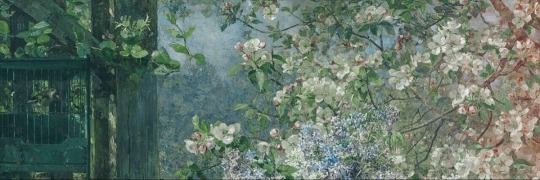
ᗢ ー ✿
8TEEN ☆
black
he/him
🎀 ⃝
aromantic acespec
stemme lesbian
Selene + Mousai devotee
𝗆𝗒 𝗆𝗈𝗈𝗇 🌙 Ꮺ ࣪˖ ᥫ᭡ 🦢ˎˊ˗
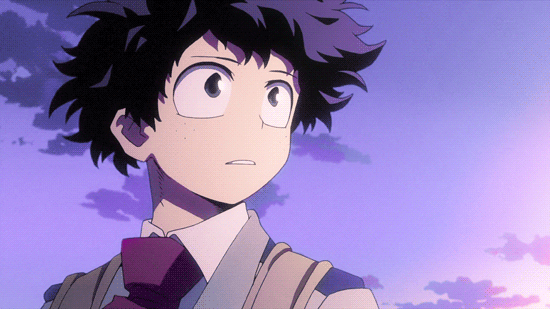
◞ ★ ︉﹒ ︉likes︔ ROBLOX N MINECRAFT <333、art, anime, music, reading, writing, skateboarding, drawing, gaming, traveling, photography, psychological horror, languages, piano ᨳ dislikes ﹕ romance, specifically het. tomatoes, bright things, loud noises, bread ◞ ★ ﹒seventeen ult︔ ︉learning japanese ﹒──── ✩!ᶻz ⸜⸜⸜⸜⸜⸜⸜⸜ㆍ﹒
( ♡ ´ ᵕ `)⠀ 🍥 ‿ ⁺ . seventeen, bibi, seulgi, melanie martinez, sza, marina the scientist, twice, miguel, gorillaz, måneskin, pierce the veil, set it off, mac demarco, victoria monet, pink panthress, jorja smith, insane clown posse, d4vd, summer walker, duckwrth, alec benjamin, txt, malice mizer, ado, eve, pomme, sleeping with sirens, bibi, get scared, ghost town, three days grace, my chemical romance 🗯️ . ⁺ ✦ ₊
Movies
˚₊🌸⊹✿ jjk 0, the call ( kdrama ), k-12, world heroes rising, unlocked, etc 𓂃★
Television
╭╯♡꒰ᵕ༚ᵕ⑅꒱﹕﹕alien stage, one piece, terror in resonance, assassination classroom, scooby doo, rugrats, bsd, my babysitter's a vampire, strawberry shortcake, scissor seven, jjk, blue lock, land of the lustrous, demon slayer, arifrueta, etc・⌘
Books
﹕𓂃⩩♡̶・| omniscient reader's viewpoint | solo leveling | trash of the count family | the song of achilles | six of crows |no longer human | oil spill | loving me right | sylo series | they'll never catch us | seven deadly secrets | junji ito works | never tell・ ೇ
¡! — 0000 ҂ᴥ • ₎ა women 🖇 ❫❫ ur mom

⊹ ׅ ⋆ ☆.ᐟ some of my tags:
#sillypoetry
#luciqsart
#selenlvr
#luciqwriting
#sillylittleselfies
#mousaiappreciation
#mysillythoughts
#one piece#orv#alien stage#femme lesbian#femme4butch#femme4masc#black femme#femme4stud#artists on tumblr#black artist#selene deity#the mousai#greek mythology#omniscent reader#orv novel#adhd#autism#anxiety
13 notes
·
View notes
Text
Muse Induced Madness
I am being driven mad by the Muses.
Will nothing satisfy them?
I stitch and I draw
And I write and write and write.
Yet they still demand and inspire me to learn
To weave and play music
And create and create and create
Until there is nothing left to create.
O Muses, how divine to be thrown into insanity
By your endless inspiration.
Bring me glory, dear Mousai,
For I go mad for no one but you.
#my writing#hellenic#hellenic prayers#hellenic polytheism#mousai#muses#poetry#hymns#prayers#theoi#paganism#paganblr#devotional#deities#polytheistic
12 notes
·
View notes
Text
How many Muses?
Given my Greek mythology posts have been sparking some interest lately, I thought: why not bring more to my fellow Greek mythology fans? And so today, what I want to talk about is, the Muses.
A lot of people only know them through the Disney movie “Hercules” - and... of course, you know how faithful to Greek mythology this movie is *cough cough* irony *cough cough*. They did get some things quite right - such as putting the Muses as narrator of the story, that’s a nice and intelligent move. And then... there’s the rest. But let’s put all that aside and take a look at who were truly the Muses.
Note: Muse is the modern, Latinized spelling and saying of the goddesses’ name. In original Ancient Greek, it is “Mousai” (Mousa in singular) (in Latin, “Musa, Musae”).
I) Homeric vs Hesiodic ; and the nine Classical Muses
As usual, what one needs to first do, when looking at a Greek deity, is compare the Homeric and Hesiodic traditions.
Homer, in his Iliad and Odyssey, describes the Muses as the daughters of Zeus. He usually talks of them in plural, and even at one point says there are nine Muses in total - but in other passages of his epic he refers to the Muse, in singular, and treats her as a singular goddess (we’ll come back to this afterward). The Muses are described as singers and music-providers for Olympus, other gods, and half-gods of note. For example they are known to be the one singing alongside Apollo’s music during the divine feasts on Olympos, and when Achilles dies, they are the ones who sing at his funeral. This insistance on the Muses being singing-goddesses is notably carried on by an anecdote Homer tells in The Iliad: it is said that a Thracian man named Thamyris pretended that he was a better singer than the Muses, and could beat them at a singing contest with ease. The Muses heard of his boasting, and angry with him, threw a violent curse at him, removing his beautiful voice AND making him unable to remember any song (or rather turning him into a “singer without memory”). Again, this is an example of the topic of “hubris punished” in Greek mythology: the gods cannot reach the same levels as the gods, as if they pretend they are better than them, they’ll lose everything. If this man had just been happy with his voice and said he was the better singer of all humankind, he wouldn’t have attracted the fury of the Muses - but he had to boast he was better than the “official” singers of the gods...
But beyond singing, Homer also heavily points out that the goddesses are deities of poetry. In the Iliad and the Odyssey, it is made very clear that the bards of Ancient Greece - the aoidoi (insulgar aoidos) - are considered the main servants of the Muse. To be a talented poet, or a talented bard, or even a gifted singer, you must receive the favors and blessing of the Muse, because it is her that offers as much poetic/singing talent as inspiration, to create songs, poems and stories. I keep saying “Muse”, singular, because in the texts of Homer, while the Muses are mostly referred to in plural as characters of the stories (at the feast of the gods, at Achilles’ funeral), whenever they are invoked as the patron of the aoidos, or when Homer himself invokes them, the singular “Muse” is used. Does Homer refer to one specific Muse among the nine, or does he unites and gather all nine goddesses into one singular deity? It is unclear. But what stays is Homer’s famous, iconic lines - his call to the Muse before beginning each of his epic, his plea for her to give him the story he needs to tell, and his thanks for her revealing to him all the secrets of the gods. Because, in these early times of Ancient Greece, the great epics and the great poems were seen as being “offered” by the gods to humanity. Poetic inspiration and poetic talent came from the gods - from the Muses to be exact - and as a result, all those great stories sung by the bards, all the myths and legends of the poets, were offered by the all-knowing Muses to humankind. Without the Muse, a poet, writer, storyteller loses as much his voice as his memory (as the story of Thamyris proves). And this is why Homer invokes the Muse and her blessing before beginning each of his epics.
(And as with providing music for the gods, Apollo also co-worked alongside the Muses when it came to teach humans how to sing and poets which story they should tell)
Now, if we go by the side of Hesiod, we do not have a contradiction (unlike with other deities). Hesiod confirms that all singers, all musicians, all poets own their talents, inspiration and gifts to the Muses and Apollo - without them, there wouldn’t be any form of art on earth. The job of the “servants of the goddesses” is to sing the great deeds of the most valorous and heroic men, and the stories and adventures of the immortal gods - and in doing so, they make people forget their troubles and sorrows... This is the nature of the service of the Muses, according to Hesiod, distract and entertain humanity not in a goal of information, but to ease the hard and difficult life of mortals. The same way Homer called upon the Muse before beginning each of his poem, and regularly asked her to “give” him the stories he was about to sing, Hesiod claims in his Theogony that all he is about to reveal was actually taught to him by the Muses, who appeared to him one day as he was on Mount Helicon. They selected Hesiod, a mere shepherd, a base man part of the lower class of Ancient Greece, and turned him into a glorious poet, into the honored and blessed servant of the gods supposed to tell their deeds for all of eternity. Though, Hesiod slides a very interesting remark in his poem... He mentions that when the Muses appeared to him, they specified that they know many true things that they tell humans... as much as they tell them false things, but worded with such talent and cunning that they appear as they are true. This mention is highly interesting: in the Homeric tradition, the Muses are all-knowledgeable because they are goddesses, and they assisted to most of the events they tell, so there is no doubt that what the goddesses bring to aoidoi are true. However, in Hesiod there is more ambiguity, as the Muses admit they are, just like poets, as much carriers of truth as bringers of lies that are so convincing they appear to be true. [There could be a whole debate on how Ancient Greeks perceived poetry, myths, and all that, but let’s keep things simple].
What Hesiod brings to the table is a lot of additional information that Homer does not give. For example he precises that, beyond Olympos (where they dwell by the side of Zeus, delighting their father with all sorts of stories of the present, the past and the future), they also dwell on the mountain Helikon (the place where Hesiod met them). On this mount, they can be seen dancing, and taking baths in springs, and at night, “veiled with mist”, they sing and praise all of the gods, from Zeus, Hera, Athena and Apollo to Gaia, Okeanos, Selene, Helios, - and many, many more. Hesiod more interestingly specifies the identity and ligneage of the Muses: he explains that they were born of Zeus and of the goddess Mnemosyne, the personification of Memory. It is said that Zeus laid down with Mnemosyne for nine consecutive nights, and that one year afterward the Muses were born, nine daughters “of one mind”, who immediately started singing with their sweet and lovely voices, and quickly went to their father Zeus, at the top of Olympos, where they still dwell to this day. Hesiod also gives each of the nine Muses an individual name: Clio, Euterpe, Thalia, Melpomene, Terpsychore, Erato, Polymnia, Ourania and Calliope.
What is quite interesting is that, in Classical Greece, a consensus and appreciation grew, in literature, poetry, philosophy and culture, that each of the nine Muses represented a different form of art - for each goddess was a specific domain, which would explain why Homer only called upon one specific Muse to sing his poems, since epic poetry would be the domain of one given Muse. This is the list and classification that is the most well-known and widespread today. But, it is present neither in Homer nor in Hesiod. In Homer the goddesses are an unnamed group, and while Hesiod gives them personal identities, he only identifies one division: between Calliope and his sisters. Indeed, Hesiod claims that Calliope is the greatest of the Muse and the leader of the nine, because her domain is to give inspiration and talent to the princes (nobility, royalty, top of the hierarchy). A bit like fairy godmothers, the Muses can take a fancy to a lovely princely baby, and upon his birth place some “sweet dew” upon his tongue, so that his words would be gracious, his judgements always true, his speech sure and his mind wise. And it is watching over those Muse-gifted princes that is Calliope’s job.
Now, I won’t go into great details into this matter more, but here is the “classical” list everybody knows today and that became with time the “traditional” and “by default” categorization of the Muses. Calliope is the Muse of epic poetry (the one that Hesiod and Homer sings, so when Homer calls upon the Muse, he calls upon Calliope). Thalia is the muse of another form of poetry, pastoral poetry, as well as the muse of the genre of the comedy (in theater, because theater is a form of poetry for the Ancient Greeks). She is opposed by Melpomene, who is the Muse of tragedy. Erato is the muse of love poems and lyric poetry as a whole, where Polymnia is the Muse of hymns, sacred poetry and religious songs. Euterpe is the Muse of music (especially flute music), while Terpsichore oversees dancing. And then come two Muses that can surprise someone today because these are thought to be science, not arts, but in Ancient Greece these domains were considered forms of art: Clio, the Muse of historians, and Ourania, the Muse of astronomers.
II) Not nine? The alternate Muses
A text is often brought up when one starts digging into the Muses. A text by Diodorus Siculus: his “Library of History”, written in the 1st century BC (so a VEEERRRYYY long time after Homer and Hesiod). As the title of the text says, it is the work of a historian trying to trace back the origins of the myths, and Diodorus take an interest in the Muses because of their association with Dionysos (this is a novelty of the late centuries of Ancient Greece - apparently the Muses had gained a new connection to the god Dionysos, when before they were just associated with Zeus and Apollo, and Diodorus even says they were paired with satyrs out of all creatures, the satyrs providing the music by instruments while the Muses sang and dance.
Diodorus presents the tradition we best know today: the Muses are nine, and the daughters of Zeus and Mnemosyne. But he also lists several alternative presents in the work of other poets, and that he believes never took off because of how prevalent and dominant Hesiod and Homer’s work were on the myth of the Muses. He notably says that some poets give the Muses a different set of parents: they become more “primordial” deities by becoming the daughters of Gaia, the Earth personified, and Ouranos, the Sky personified - which would make them sisters of the Titans. He also adds that before Hesiod and Homer made the number nine popular for the Muses, there were only three of them. Other details he mentions that were present in his time but not in Hesiod or Homer’s texts are that 1) The Muses apparently discovered letters, and how to arrange them to form words, creating the first poem by doing so. 2) The Muses are eternal virgins - because, as Diodorus suggests, it furthers the allegory of a “pure and uncontaminated education” to reach the peeks of poetry. Though again, in Homer and Hesiod no mention of virginity, discovering letters or hanging out with satyrs. In fact it is quite bizarre to have virgin goddesses partying with satyrs... But by the 1st century BC things had grown very bizarre in Greek mythology. Even weirder of course is the fact that in older texts and legends, Muses were clearly not virgins as Calliope for example was renowned as the mother of Orpheus... It seems the whole “virgin” thing was a very late addition to the myth - as Diodorus says, it seems to mostly exist as an allegory for the “purity of the art” or whatever.
What is very interesting here is the mention that “Before they were nine, they were three...”. It is a topic that has been getting some interests today: the “original trinity” of Muses. At this point things however get a bit complicated and broken down... For example Pausanias, in the second century AD (so long after Diodorus himself), in his “Description of Greece”, claims that the Aloades, Ephialtes and Otos, were the first to honor and sacrifice to the Muses, on the Mount Helikon, and that when they started the cult of the Muses, there were three of these goddesses: Melete, the personification of practice, Mneme, personification of memory, and Aoede, personification of songs. Pausanias however claims that afterward, the original three Muses were changed into the nine we know today. He also mentions an obscure poet of the 6th century BC, Mimnermos, who claimed there were two sets of Muses: an “older” group, born of Ouranos, and a “younger” group daughters of Zeus (and we know by other sources that Mimnermos, like other poets such as Alcman, poets of the 6th or 7th BC century, was one of those poets that attributed the birth of the Muses to Gaia and Ouranos... So from these informations, it seems the Muses were originally three goddesses born of Ouranos and Gaia, elderly deities representing the three parts of art (practicing, memorizing and then singing/performing), but that with time they were “de-volved” into daughters of Zeus, and nine personifications of different types of art.
It is a quite simple and interesting concept... if it wasn’t for other little tidbits that complicate the matter further. For example there are fragments and information about another obscure poet of the 7th or even 8th century BC, from Corinth, who also listed the Muses as three... but as the daughters of Apollo, with different names from the ones listed above, and who were co-worshipped alongside their father at the Delphi sanctuary (you know, Delphoi, where Apollo had his main oracle). The Apollo symbolism seems reinforced by the fact that, according to some sources, these three Muses were named after the three chords of the lyre, the sacred instrument of Apollo: Nete, Mese and Hypate. This was not however their only set of names: the obscure poet I talked above rather gave them the names Cephisso, Apollonis and Borysthenis. Overall it makes sense that in some areas they would be seen as the daughters of Apollo, given how strongly they are associated with him, sharing most of their domains and activities with the god: in fact, one of Apollo’s epithet was “Muse-Leader”, Apollo Mousegetes.
So... it seems yes there might have been originally three Muses - but the idea of these Muses as sisters of the Titans and a primordial trinity of art goddesses was not the only one prevalent in Greece. In Apollo dominated area, they were his daughters and personifications of the music of the lyre.
It is quite poetic however that we still keep the importance of the number three by having still three different sets of Ancient Greek Muses today - the daughters of Zeus, the daughters of Ouranos and the daughters of Apollo. (I know there is a fourth set about four different Muses - but given it was written by Cicero and is part of Roman literature I will gently push them aside, because we focus on Greek things here).
EDIT: I forgot to mention the Homeric Hymns! I didn’t want to put them alongside Homer’s “certified” work like the Iliad of the Odyssey, since too many people make the mistake the Homeric Hymns are authored by Homer “for sure”... Anyway, to add some more info, in the Homeric Hymn to Artemis, it is mentioned that the Muses dance with the Charites at the house of Apollo, at Delphi, and that sometimes Artemis joins to “order” and “lead” the dance. The Homeric Hymn to Apollo however rather presents them, in their “usual” setting, as singing hymns in the “house of Zeus” at the top of mount Olympos (though their song isn’t just about the glory and gifts of the immortals, it also apparently involves describing the suffering, weakness, helplessness and misery of humankind...). Finally, in the Homeric Hymn to Hermes Apollo describes himself not as a master or leader interestingly, but as a “follower” of the Muses of Olympus.
21 notes
·
View notes
Note
11 & 20 :)
11.) What deity do you think your taste in music best represents, regardless of who you worship?
Apollon and the Mousai best represent my eclectic taste in music!
20.) What’s something new you want to try in your worship?
I want to start incorporating meditative practices into my worship again. I used to meditate often but fell out of my routine early on. I’d like to get serious about it soon.
#Meleagros answers#ancient Greek religion#Hellenic polytheism#Hellenic polytheist#Hellenic polytheistic#Hellenic paganism#Hellenic pagan#polytheism#polytheist#paganism#pagan#paganblr#Hellenism#Hellenismos#Hellenic reconstructionism#Hellenic reconstructionist#ancient Greece#Classical Studies#Classicsblr#Archaeology#Archaeoblr
13 notes
·
View notes
Text
Greek Gods 101: Erato
Erato is a Mousai of erotic poetry and mime. Excluding the universal offerings, some common offerings include:
Erotic Poetry
Screenplays
Scripts
Love Letters
Symbols of Love (Rings, Hearts, Etc.)
Roses
Depictions of Doves
Perfumes or Colognes
For devotional acts, some activities that can be done for her include:
Writing Erotic Poetry
Writing Love Letters
Writing Romance
Watching Comedies
Watching Plays
Learning How to Act
Listening to Theater Soundtracks
Going on Dates
She is not celebrated in any Athenian holidays.
#erato#erato mousai#erato muse#erato goddess#erato deity#deities#hellenism#helpol#hellenic#hellenic pagan#hellenic polytheism#hellenic polytheist#hellenic community#hellenic deities
17 notes
·
View notes
Quote
The Muses were goddesses of poetry, but poetry itself encompassed a very wide domain. Many of the pre-Socratic philosophers (Parmenides, Xenophanes, Empedocles) expressed their thoughts in poetry, and Empedocles, at least, invokes the Muses for their aid. [...] Empedocles' use of the figure of the Muse should remind us of the range of the Muses' functions in the culture of early Greece: not only are they givers of pleasure who soothe cares and immortalize the deeds of men in song, as daughters of Mnemosyne they know everything about the past and the unseen world of the gods, and they are also authorities on ethical matters and wisdom generally.
Penelope Murray, “The Muses and their Arts”
#penelope murray#the muses and their arts#muses#mousai#pre socratics#empedokles#hellenic deities#mnemosyne#poetry#philosophy#wisdom#quotes#ancient greece#music
29 notes
·
View notes
Text
A little appreciation for the domains of a deity that don't get much attention/recognition. I'm making this because I do think it would be lovely if the aspects mentioned below got more attention, and additions not mentioned are welcome so long as it's an obscure part of them. This was going to be just a few and then I got carried away and did the main Twelve Olympians
A little love for:
Apollon as the God of Foreigners (the Arcadian friendship's harmony with Hermes being the god of travelers/way-god couldn't be any louder)
Aphrodite as a Goddess of the Arts (anything love-themed falls to her by default)
Ares of Civil Order, Defender, and Of Courage
Artemis as the Goddess of Dancing and equal Leader of the Mousai
Athene as the Goddess of Carpentry, Metalwork, and Sculpting
Demeter as Friend of Peace and Law-Giver
Hephaistos as the one with a delicate touch that creates beautiful works of art (It isn't so much unknown but honestly the thing I love most and not the first thing one thinks of with his talents/image)
Hera as the Skillful Bender of Language, Bender of Oaths and Promises
Hermes, God of Peace/Diplomacy, Divine Protector of All, as well as a God of Poetry and Knowledge (rightfully the other half to Athene)
Hestia of the Earth, Earth Dwelling and Delighting in the Works of Man, The One That Made Buildings
Poseidon of Fertility, the Plant Nurturer, and Holder of the Earth
Zeus of the People, Gracious and Merciful, Of Refuge, Counsellor
#hellenic polytheism#hellenic pagan#hellenic gods#hellenic paganism#hellenic polytheist#helpol#apollon#apollo#apollon deity#aphrodite#aphrodite deity#ares#ares deity#artemis#artemis deity#athene#athena#athena deity#athene deity#demeter#demeter deity#hera#hera deity#hermes#hermes deity#hestia#hestia deity#hephaistos#hephaestus#poseidon
1K notes
·
View notes
Text
Hey, does anybody else get signs from different deities outside of their practice?
For those of you who don’t know, I’m a Christopagan witch who believes in the various spirits I believe in are pluralistic manifestations of of God who dwells in everything. To put it more simply, all the spirits I talk about (Lady Sophia, Jesus Christ, Holy Mother Mary, the Angels...) on my blog are all simply aspects of God with names, differing personalities, and spheres of influence to govern over.
But recently, I've been having this dream where I’d be waking through a forest (no clue why) and I start hearing these ladies singing and its like its the most awe-inspiring singing I’ve ever heard. I can’t make out the words so I follow this song to a clearing where I see this group of nine women just singing and dancing around this pool of water. Then one of the ladies tells me to sit on a rock by the pool and sketch what I see. After I finish the same lady comes over and crowns me with a wreath of some leaves that are wide but come at a point on the ends and point in the same direction. And then I woke up.
At first I thought this was a one off dream and nothing special...But then it happened again...and again...and again...and now it's been a solid 2 months of that same dream happening nearly every night and after some advice from Mother Mary and Lady Sophia (who told that this “definitely wasn't a coincidence” and “I should try looking up Greek mythology” respectively), I found that a group of goddesses called the Mousai(Muses) fit this group of dream ladies description and after reading about them, something in my head just clicked.
But now I’m stuck here because its not like most forms of Christianity meshed well with any Greek based religions in history and I still have to deal with the fact that I don’t really think that the Greek gods would like being referred to as aspects of some larger god...And like I said, I’m kinda stuck here. Maybe my thinking's too Christian or I’m going about this in a weird way but...yeah that what I’ve been dealing with for the past few months, folks....
#Also school ended so I can post more!#hell yeaaaaaaah#Lav's Book of Shadows#Look who's posting since forever ago#Questioning ur beliefs is sooo hard#Why can't I just stick to one belief system#Ah well#More screaming into the void I guess...
0 notes